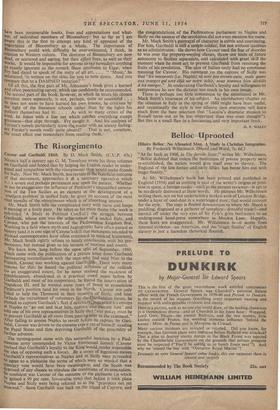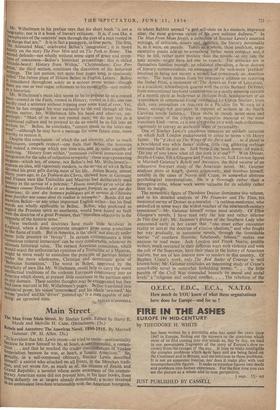Belloc Uprooted.
HilaireBelloc: No Alienated Man. 4 Study in Christian Integration. By Frederick Wilhelmsen. (Sheed and Ward. 7s. 6d.) "As far back as 1908, in The Servile State," writes Mr. Wilhelmsen, "Belloc deduced that unless the institution of private property were re-established, the nation would give itself over to slavery. The England of the late forties and early fifties has borne him out with tragic finality."
As Mr. Wilhelmsen's book has been printed and published in England (1954) and as nothing is said of the writer's origins or posi- tion in space, a foreign reader—such as the present reviewer—is apt to be needlessly distressed at these words. He pictures Mr. Wilhelmsen writing them, not on but underneath a broken arch of London Bridge, under a layer of coal-dust in a waterlogged punt; that would account for the style. The copy is floated downstream to where Mr. Shoed is paddling, disguised as a gatherer of samphire—dreadful trade !—and carried off under the very eyes of Sir Fyfe's grim beef-caters to an underground hand-press somewhere in Maiden Lane. Happily, these fears are exaggerated. Mr. Wilhelmsen is—it seems from internal evidence—an American, and the 'tragic finality' of English slavery is just a harmless rhetorical flourish. Wilhelmsen in his preface says that his short book "is not a olography, nor is it a book of literary criticism. It is, if you like, a Petaphysics of the concrete' seen through the eyes of a man rooted in ;Ile things that are." It is in fact a panegyric, in four parts. The first, No Alienated Man,' celebrated Belloc's 'integration'; it is based rilainly on the story The Four Men and on The Path to Rome. The rcond defends—not wholly without some signs of grace and symp- ;ms of uneasiness—Belloc's historical proceedings: this is called Grizzle-beard: History from Within.' Christendom: Esto Per- Petun,' the third section, continues the discussion of the historical Writings. The last section, not quite four pages long, is spaciously Failed `The future place of Hilaire Belloc in English Letters.' Belloc ss considered throughout solely as a serious prose writer—though there are one or two vague references to his comic gifts—and mainly as a historian.
Mr. Wilhelmsen's main idea seems to be to present to us a rooted hardly in the Faith, rooted in History, rooted in Life; one can nardly read a sentence without tripping over some kind of root. Yet,
he he has snagged his way earnestly to the end through all this fibrous matter, Mr. Wilhelmsen lifts his head and observes, sur- prisingly: "Most of us are not rooted men; we do not live in a traditional culture and to pretend to do so would be to fall into an archaic lie." Belloc, he concludes, "cannot speak to the latter-day Man"—although he ntay have a message for some future time, more, Worthy to receive it. Despite this conclusion—of which the sad sincerity, after so much enthusiasm, compels respect—one feels that Belloc the historian had indeed a message which our time was, and is, quite capable of receiving. `History from within,' conscious cultural immersion and integration for the sake of subjective sympathy': these unprepossessing slogans—which are, of course, not Belloc's but Mr. Wilhelmsen's- express an idea, still vigorously modern, to the service of which Belloc devoted his great gifts during most of his life. Julian Benda, almost thirty years ago, in La Trahison des Clercs, showed how in Germany tind France rrien like Treitschke and Maurras had deliberately used i in the service of a polemic: "Disons toutefois qu'en rerite des ollows comnze Treitschke et ses homologues frangais ne son! pas des historiens; us son! des honunes Politiques qui se servent de l'histoire Pour fortifier une cause dont ils veulent le triomphe." Benda did not mention Belloc—or any other important English writer—but his final words are wholly applicable to Belloc. Belloc, who professed to regard the Prussian spirit as anathema, would have found no fault With the doctrine of a great Prussian, that "bloodless objectivity is the 0Pposite of the historic sense."
These methods and doctrines have made little headway in tngland, where a dense corporate smugness gi,vps some protection to the flame of truth. But in America, is the' clerk' not already under !'enle little pressure to 'betray'? In certain circumstances a little conscious cultural immersion' can be very comfortable, whatever its ultimate historical value. The earnest American conscience, which would reject the authoritarian cynicism of a Treitschke or a Maurras, Might be more ready to assimilate the principle of partisan history Under the more wholesome, Christian and democratic guise of 113 ellocian humanism.' The worst in Belloc, approved by the simnlicity of men like Mr. Wilhelmsen, could help to carry the worst intellectual traditions of the endemic European controVersy into an A. Meriett which shows, at present little resistance to the partisan spirit In any domain. These sombre thoughts may be exaggerated but they find some warrant in Mr. Wilhelmsen's pages. Belloc translated into industrial prose, his vision `concretised' and his ideals 'oriented,' his senses 'peeled' and his 'drives' pointed up,' is a man capable of any-



































 Previous page
Previous page